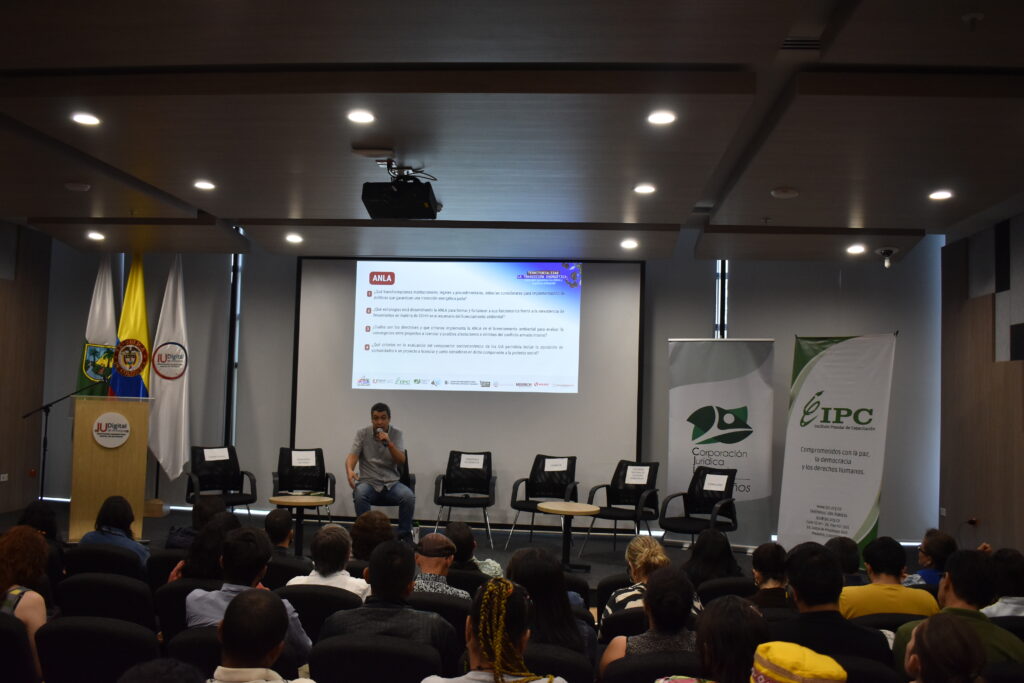Antioquia Territorial Session
COMMUNIQUÉ TO THE PUBLIC

The Mesa por los derechos humanos frente al poder empresarial is an autonomous space, active since 2016, of environmental, social and human rights organizations from civil society in Colombia, for dialogue, dissertation, mutual learning and the search for common proposals around the critical analysis of corporate behavior in the country.
The commitment to decentralize the collective action of the Mesa's organizations, and to support community ownership and participation in energy generation projects, were the main drivers that led to the forum Territorializing the energy transition: challenges to guarantee human rights and environmental justice, an exercise to learn about and give rise to social and community experiences around the diversification of energy production, recognizing the entire social, cultural, economic and environmental process of the territories.
The forum sought to bring together technical positions with the territorial experiences and demands of social organizations from the sub-regions of Bajo Cauca, Oriente, Suroeste and Nordeste of the department, who have been subject to human rights violations due to large corporate energy generation projects.
Different entities were summoned to this space, including the Ministry of Mines and Energy, the National Environmental Licensing Authority - ANLA, Corpourabá, Corantioquia, Cornare and the Ministry of Environment and Development, of which only the latter attended, and only virtually. Despite the invitation with sufficient advance notice and due notification, some entities did not even respond and others informed of their non-attendance, a situation that left more questions and concerns to the attending organizations, regarding the projects and licensing processes in the aforementioned subregions.
As social, peasant, indigenous, Afro-descendant and civil society organizations, MANIFESTAMOS that:
- It is essential for the State to dialogue with the communities that inhabit the territories and suffer the social, economic, cultural and demographic changes resulting from the installation of projects that violate their fundamental rights, contrary to what should be a territorialized commitment to a truly fair energy transition for citizens.
- The energy transition cannot be restricted to business processes and market solutions, imposing a top-down corporate model. We urge the generation of effective spaces for participation and decision making on the agendas and commitments for a just and popular energy transition, we do not want more dynamics and models of land grabbing and dispossession of lands and territories of indigenous, Afro-descendant and peasant communities.
- It is essential to rethink the current economic system. We cannot continue under models that promote the commodification of the commons, even when it is evident that we exceed the limits of the earth. We must combine social justice with environmental justice, transforming the radical inequality that exists in relation to the way in which common goods are distributed, through the promotion of and participation in energy democracy.
- It is important to implement and guarantee the right to consent, as prior, free and informed consultation is insufficient in the current scenario where extractive models are imposed. Communities have the right to participate broadly in the planning and projection of our territories; it cannot be that participatory scenarios are reduced to the socialization of companies, the mere notification, excluding our opinions and experiences.
- A just energy transition cannot be understood exclusively as the reduction of greenhouse gas emissions through technological innovation in renewable energies. It must encourage discussion on the socio-environmental impacts of energy and recognize the continuity of violence, injustices, conflicts and extractivism on the bodies, lives and territories that are in the midst of the transitional promise.
- Accompaniment actions, the implementation of protection protocols and guarantees of the rights of those who defend life, common goods and territories cannot be delayed any longer. Human rights defenders are singled out, stigmatized, sued, threatened, displaced, disappeared and murdered. Defending life, land and territory is not a crime, the attacks must stop immediately and the State is responsible for guaranteeing it.
- We recognize the challenges and the joint work that must materialize between the communities and the State, which is why we convened this meeting and will remain open to dialogue. However, there remains the unpleasantness of not attending, of empty chairs and incomplete answers to the questions and demands that we have and have expressed for decades, from our life experiences as communities that inhabit the territories.
- We consider that these spaces for meeting and dialogue are an opportunity for access to information, which should not be limited to formal request processes through mechanisms such as petition rights and PQR, as alluded to in the Escazú Agreement. It is essential that public and private institutions facilitate dialogue with communities and provide sufficient, timely and clear information on business projects to allow for public debate.
Human Rights Roundtable to confront corporate power
Social processes of Antioquia that adhere:
Asociación de afectados del cañón Porce, AFEPORCE
Movimiento Social por la Defensa del Agua, la Vida y el Territorio, MOVETE
Red Pluriétnica por la defensa del territorio y los derechos humanos del Bajo Cauca
